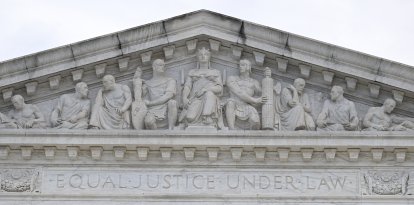Analysis
Woke, powerful and controversial: Katherine Maher's reign at NPR on a tightrope
Although Maher is not a career politician, her alliances, militancy and positions place her firmly on the most left-leaning spectrum of the Democratic Party.

Katherine Maher, CEO of NPR.
As the current president and CEO of National Public Radio (NPR) since March 2024, Katherine Maher has emerged as a high-profile executive whose decisions and words resonate beyond the airwaves.
Radicalism, wokeism and millions of dollars under scrutiny
Maher's radical leftism and adherence to wokeism have been constant fuel for her critics. During the Black Lives Matter (BLM) protests in 2020, she tweeted, "I mean, sure, looting is counterproductive. But it’s hard to be mad about protests not prioritizing the private property of a system of oppression founded on treating people’s ancestors as private property”.
I mean, sure, looting is counterproductive. But it’s hard to be mad about protests not prioritizing the private property of a system of oppression founded on treating people’s ancestors as private property.
— Katherine Maher (@krmaher) May 31, 2020
This implicit defense of street mayhem, along with statements such as "white silence is complicity" and that America is "addicted to white supremacy," paint her as a figure who embraces a radical rhetoric that goes beyond traditional progressivism.
White silence is complicity. If you are white, today is the day to start a conversation in your community.
— Katherine Maher (@krmaher) June 2, 2020
During her tenure at Wikipedia, she abandoned the mission of a "free and open" internet as a "white, male, Westernized construct," a turn many see as a betrayal of the platform's original ideals in favor of an identitarian agenda.
EXCLUSIVE: Katherine Maher says that she abandoned a "free and open" internet as the mission of Wikipedia, because those principles recapitulated a "white male Westernized construct" and "did not end up living into the intentionality of what openness can be." pic.twitter.com/Ved9mgGvJH
— Christopher F. Rufo ⚔️ (@realchrisrufo) April 18, 2024
At NPR, its leadership has been accused of transforming a public institution into a loudspeaker for leftist narratives, with critics such as Congressman Brandon Gill questioning it in 2025 for "woke" content such as stories about "queer dinosaurs."
In response, Maher dodged the accusations, but her record speaks for itself: She was an executive who views truth as a "distraction" during a section of the speech titled "What Wikipedia Teaches Us About Balancing Truth and Beliefs.”
During that speech, she also said, "that perhaps for our most tricky disagreements, seeking the truth and seeking to convince others of the truth might not be the right place to start."
STATE FUNDED MEDIA: NPR's CEO Katherine Maher explained, "Truth is a distraction from getting things done". She didn’t realize that 100% of NPR’s editorial staff were Democrats and has never seen any bias in the newsroom. pic.twitter.com/gJldvEUZf5
— @amuse (@amuse) March 27, 2025
As for funding, Maher has built a lucrative career in the NGO and media world. According to reports from Capital Research Center, in her last full year at the Wikimedia Foundation (2020), she earned $409,005.
While her salary at NPR has not been publicly disclosed in 2025, it is estimated to be in a similar range or higher, given the organization's size and annual budget, which exceeds $300 million. Approximately 10% of this comes from federal funds through the Corporation for Public Broadcasting (CPB), an agreement with the Congressional Research Service (CRS).
The remainder is funded through private donations, sponsorships and contributions from local stations, many of which depend on large progressive foundations such as the Gates Foundation (which donates $2,000,000) or the Hewlett Foundation (which contributes $1,200,000).
Maher, personally, does not seem to rely on a single "patron." Her wealth and projects have been sustained by her tremendous ability to insert herself in elite networks where money and power flow between institutions aligned with her leftist vision.
A career between technology and globalist influence
Maher's path began far from the political spotlight. After graduating in 2005 from New York University with a focus on Middle Eastern and Islamic studies, she went on to work at organizations such as UNICEF and the World Bank.
Katherine Roberts Maher, born in Wilton, Connecticut, the daughter of Gordon Roberts Maher, a "commodities" businessman, and Senator Ceci Maher, a Connecticut Democrat, is not a conventional political figure. She has not held a seat in Congress. Yet her career, woven among global organizations, weighty institutions and an ideological bent that does not go unnoticed, has placed her at the center of debates about power, influence and bias in the United States.
Her trajectory (which includes roles at the Wikimedia Foundation and the Department of State, among others) reveals a woman whose professional life is deeply intertwined with the Democratic Party's leftist currents and controversial episodes, such as her handling of the Hunter Biden scandal, the son of the Democratic former president Joe Biden.
Between 2010 and 2011, she joined the National Democratic Institute (NDI) in Washington, an entity linked to the Democratic Party. This role marked her first formal connection to an institution aligned with Democratic ideals, laying the groundwork for a career combining technology and progressive agendas.
From 2013 to 2014, Maher was director of advocacy at Access Now, a digital rights organization, before taking a significant leap in April 2014 by joining the Wikimedia Foundation as director of communications.
Two years later, in June 2016, she took over as executive director, leading the organization behind Wikipedia until April 2021. Under her watch, Wikipedia reached record public trust levels and expanded its global reach. After leaving Wikimedia, Maher moved even closer to the U.S. political establishment.
She served on the Department of State's Foreign Affairs Policy Board under the Joe Biden administration from June 2022 to January 2024.
Simultaneously, in 2023, she was a professor at Stanford University. Between October 2023 and January 2024, she took over as CEO of Web Summit, a renowned technology conference, before resigning to take the reins of NPR. Her time at these institutions not only underscores her ability to navigate between sectors such as technology, media and politics but also her closeness to power networks associated with Democrats.
Political alliances and the Democratic Party
Although Maher is not a career politician, her alliances and positions place her firmly on the progressive spectrum of the Democratic Party. Her work at NDI and her role at the Department of State under Biden are clear indications of this affinity.
In addition, her membership in the Council on Foreign Relations, an influential think tank with strong ties to the U.S. political elite, reinforces her position within circles that often align with Democratic priorities.
On social media, Maher has made no secret of his sympathies. In November 2020, she tweeted, “It’s so strange to be called a 'Biden supporter.' I’m a supporter of human rights, dignity, and justice.”
It’s so strange to be called a “Biden supporter.” I’m a supporter of human rights, dignity, and justice.
— Katherine Maher (@krmaher) November 7, 2020
But that same year, she was seen sporting a Biden campaign hat, describing it as "the best part" of her efforts to mobilize the vote, and confessed she couldn't "stop crying with relief" after his election victory.
I can’t stop crying with relief.
— Katherine Maher (@krmaher) November 7, 2020
The best part of AZ GOTV is my Biden grandpa hat. pic.twitter.com/EvoJax9h2b
— Katherine Maher (@krmaher) November 2, 2020
Earlier, in 2016, she expressed support for Hillary Clinton but criticized her use of terms such as "boy and girl" as exclusionary for non-binary people. This stance reflects her sensitivity for the left wing of the party.
I do wish Hillary wouldn't use the language of "boy and girl" - it's erasing language for non-binary people.
— Katherine Maher (@krmaher) October 10, 2016
These public statements have fueled the perception of Maher as an ideologically compromised figure, a narrative that would intensify with subsequent controversies.
Controversies marking her career
Maher's career has not been without shadows. Her tenure at NPR, in particular, has been a magnet for criticism, especially from conservative quarters who accused her of importing a progressive bias into a partially publicly funded organization.
An essay by veteran NPR editor Uri Berliner, published in The Free Press in April 2024, rocked the organization.
Berliner denounced a "leftist bias" in coverage of issues such as Russiagate, the COVID-19 origin theory, George Floyd, and Hunter Biden's laptop. He noted, moreover, that in 2021, he found a diversity problem in noting that there were 87 registered Democrats and zero Republicans in the NPR newsroom.
At the time, Berliner said, "When I suggested we had a diversity problem with a score of 87 Democrats and zero Republicans, the response wasn’t hostile.” “It was worse. It was met with profound indifference.”
He further noted, "We’re looking for a leader right now who’s going to be unifying and bring more people into the tent and have a broader perspective on, sort of, what America is all about. And [Maher] seems to be the opposite of that."
Maher, fresh into her NPR tenure, had already taken shots at Republicans, with her old tweets where she called Donald Trump a "deranged racist sociopath," stoking the fire.
What is that deranged racist sociopath ranting about today? I truly do not understand.
— Katherine Maher (@krmaher) May 14, 2020
Another controversial episode occurred in 2021 when Maher, then at Wikimedia, described the First Amendment of the United States as the "number one challenge" to combat misinformation, a statement her detractors pointed to as an attack on free speech. Although she later clarified that her words were taken out of context, the incident left a mark on her reputation, especially among those who see her as an elitist disconnected from traditional American values.
The Hunter Biden case: A "late" admission
No controversy has been as defining for Maher at NPR as her handling of the Hunter Biden laptop scandal. In October 2020, when the New York Post revealed the existence of a computer allegedly abandoned by Joe Biden's son with emails suggesting influence peddling, NPR opted not to cover the story in any significant way.

Politics
NPR chief admits to Congress it was a mistake to discredit and not cover Hunter Biden's laptop story
Emmanuel Alejandro Rondón
Terence Samuel, then managing editor, justified the decision: "We don’t want to waste time on stories that aren’t really stories.” Conservative media criticized this stance as a deliberate suppression, accusing NPR of protecting Biden during the presidential campaign.
The issue resurfaced with a vengeance in 2024 after Berliner's essay. Pressured by public opinion, Maher confronted the issue directly on March 26, 2025, during a Congressional hearing led by Republicans, including Marjorie Taylor Greene.
In a shocking moment, she admitted, “I do want to say that NPR acknowledges we were mistaken in failing to cover the Hunter Biden laptop story more aggressively or sooner.” She added that she and the current editorial leadership considered that decision a mistake. This admission surprised many and was seen as a victory by NPR's critics.
However, this admission did not calm the waters. Greene confronted her with her past tweets, such as the one that called Trump a "racist" and another that described America as "addicted" to white supremacy, accusing her of bias.
Maher responded that she regretted those comments and that NPR "has work to do" to provide reliable reporting, but the hearing made clear that the Hunter Biden case remains a sticking point in his leadership.
At a crossroads
Katherine Maher is a paradox: an unelected executive whose influence transcends traditional policy boundaries, a staunch advocate for leftist causes who navigates institutions of mass outreach, and a leader whose career is marked by persistent controversies, as is the fact that NPR presents itself as a "public" service while she runs it as a personal fiefdom.
Republicans insist on calling for the total elimination of federal funding to CPB, accusing NPR of being a radical leftist ecosystem.


























